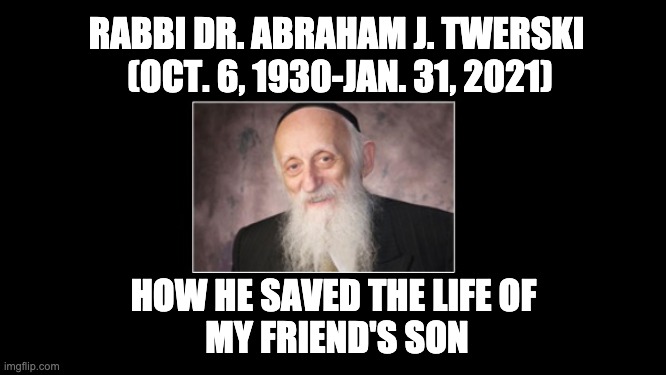Rabbi Dr. Abraham J. Twerski passed away on January 31. “Twerski was a scholar with feet planted firmly in two worlds — the rabbinic world of Torah and Talmud study, and a medical doctor and licensed psychiatrist. It was a rare pairing that earned him respect in both the insular ultra-Orthodox Jewish world and wider American society. He was an expert on addiction and scion of a long line of prominent rabbis descended from the 18th-century founder of Hassidic Judaism, the Baal Shem Tov.” Rabbi Abraham Twerski
Today many articles are talking about the success of the Rabbi. However, I witnessed it personally. In 2004 a close friend of mine discovered his teen-aged son was addicted to drugs and getting violent with family. Today his son is clean, married, and holding down a good job. The turn-around of the former addict began in a rehab center led by Rabbi Twerski.
I wrote the emotional story below about my friend and his son seventeen years ago for AISH.com.
I re-share it today to honor the Rabbi, to help people recognize some of the warning signs of drug abuse, and to help them realize there is always hope.
Drugs: A Jewish Problem?
Drug abuse is not something often spoken about in the Jewish community, yet it does exist. And it’s a problem that could grow unchecked.
A friend of mine, a synagogue Chazan (cantor), is trying to help his 15-year-old son win a fight against abuse. It was Friday night at the synagogue when he told me:
“I had to call the police again today.” I studied the Chazan’s face as we spoke; usually, he had a mischievous smile. It was a look that made you feel that he was about to play a practical joke of some kind. Today he looked different, his face was pasty white, and that twinkle in his eye was gone, replaced by dark gray bags. His hands were shaking as he continued. “There was a knife in his hand. He threatened his mother with it. Said he was going to stab her and then cut his wrists.”
He said that things had calmed down after the police had left, but he was worried about what was happening at home now, while he was leading the Shabbat services.
I was flabbergasted. My friend’s son is a good kid with a good heart and a deep concern for those who have no one to fight for them. He used to babysit my kids on Saturday nights. Threatening violence was so out of character. Sure I heard grumbling from my friend about his son not completing schoolwork nor doing tasks around the house when asked. But I had always attributed them to basic father-son stuff.
As I went back to my seat in the sanctuary, I realized that things did seem to be deteriorating over the last couple of months. The boy seemed to have fallen in with a bad crowd, a crowd that would hang out on the Chazan’s front lawn at all hours of the night. One Friday evening, the boy invited 75 of his closest friends over. The police had to be called to disperse the kids.
This past summer, his parents sent him to USY on Wheels hoping that he would find some nicer friends, but he got thrown out because he was insubordinate and wouldn’t follow the camp rules. Upon arriving back home, the downward slide accelerated. He would just go AWOL, and more than once, my friend had to file a missing person’s report.
Of course, all this activity started the congregation rumor mill. Because of my friendship with the Chazan, people would come up to me and say, “I just want to let you know what I heard…? In some cases, people showed genuine concern for the Chazan and his family, but other times the report ended with, “It doesn’t look good for the synagogue.” Almost as if graduating from a seminary made one immune from family issues.
As the school year went on, truancy became an issue. The kid’s failure to go to school, follow basic family rules, or show any respect for his parents was causing an increasing amount of incidents at home. It seemed like both sides were digging in. The parents would say: “You are 15. You can’t just go out whenever you want.” The son would say that he was tired of living in the fishbowl of being a Chazan’s child and that his parents needed to show him some respect.
Worse yet, a once-close family seemed to be splitting apart at the seams. One daughter was getting stomach pains every time there was an argument. My friend’s wife had to be rushed to the hospital with heart pains after a major blowout. It seemed like the rest of the kids were taking sides.
The school district was getting involved. My friend got a call from the dean of students: Their son was truant and failing out of school. Habitual truancy results in the Family Court finding a way to force the child into school, usually via some sort of group home. The dean offered the option of putting the boy in the district’s PINS program (PINS = People In Need of Supervision). Designed to avoid the courts, PINS provides a probation officer for the kid. The probation officer draws up a document that describes the child’s issues and an action plan for how to address them. The officer, parents, and child all sign the document, and then they would all get to work straightening things out.
There was only one problem. The kid refused to sign. Worse than that, he tore up the document in front of the judge.
Judges aren’t big on insubordination, even from a troubled teenager. The 15-year-old was led away in handcuffs, crying out to his parents: Why did you let them do this to me?” He was placed in a county detention center run by a local church to spend the weekend.
While such facilities serve an important purpose, they are no place for a Jewish kid from an observant family. He was ridiculed for not bowing his head during grace or going to church. And even though one of the fights with his folks was resisting Jewish practices, he was being served non-kosher meals and was not happy about it.
After a few days in the detention center, he signed the document. The judge told him to go to school and follow family rules. Any deviation from this, and he would be sent away.
Now it was four days before the next court appearance. The police had made another visit (the knife-threat incident), and the Chazan was afraid this might mean his son gets sent away for a long time.
After services, my wife and I dropped our kids home and went to our friends to try to lend support. As we sat around the dining room table, they told us that there was another element to the problem. More than a matter of disobedience, they were convinced their son was using drugs. “Come on,” I said. “He’s a good kid. Drugs? That’s not a Jewish problem!”
Fighting back the tears, they went on to say that when the boy was in his room, even on the coldest of days, they would sometimes hear the fan blowing and see the windows open. At times his eyes were beet red, something they had usually attributed to allergies. And then they?d found some pipes. What they had suspected for a while, they were now sure.
As we were leaving, the chazan pointed out a van parked in front of his house. He said they were his son’s friends waiting for him to sneak out. The hatch was open, and there were kids sitting in the back of the van smoking pot.
The next day the Chazan went on a quest. “Isn’t there a Jewish treatment facility? Anywhere?” No one knew. Drug abuse is not something that gets talked a lot about in the Jewish community — our kids don’t become addicts—but they do. Anyone that he talked to had no idea of where to send a Jewish child for help.
Finally, the Chazan called to tell me that through an amazing string of coincidences, he discovered that there is only one Jewish residential drug and alcohol rehabilitation center in the entire United States, the Yatzkan Center. It is privately funded and located on the grounds of Brunswick Hospital in Amityville, New York. The center is run under the guidance of Abraham Twerski — the psychiatrist and professor who is recognized as one of the country’s leading authorities on substance abuse. He has written over 20 books and has lectured all over the world on the problem of chemical dependency. And to top it all off, he is an ordained rabbi, directly descended from the saintly Baal Shem Tov.
At family court, my friend was able to have his troubled teen assigned to Yatzkan. He left for the center on Monday morning, and of course, arrived with a bang. When the staff searched his luggage (standard procedure for new patients), they found a stash of marijuana, pain killers, hallucinatory mushrooms, you name it.
It would be a long road ahead.
At Yatzkan, the staff takes time to answer questions and provide much-needed support to the entire family. Unlike the county facility, the boy was sent to first, he was now amongst other Jewish teens, learning how to cure this addictive disease. The teens come from all corners of the U.S., from all denominations and all levels of observance. To accommodate everyone, only kosher food is served, and Shabbat is observed in public spaces, but religion is not forced upon anyone.
The program at Yatzkan is the traditional AA 12-Step Program with a Jewish twist. On average, the program lasts 10 months, and Rabbi Twerski’s program has a success rate of an amazing 80%, far above most other long-term residential facilities and almost double that of the standard 28-day detox centers. Every Sunday, there is a family counseling session where the entire family tries to work through the problems associated with drug abuse.
Most of all, he urges the Jewish community not to sweep the problem under the carpet.
I recently read a piece that Rabbi Twerski wrote, published by JACS (Jewish Alcoholics, Chemically Dependent Persons, and Significant Others – www.jacsweb.org). In the article, Rabbi Twerski discredits the fairy tale that Jews don’t drink alcohol or take drugs. He warns of the “growing malignancy” that is alcohol and other chemical abuse. Unchecked, it can kill the abuser, break up families and eventually destroy a community. He urges clergy education programs to teach Clergy and other Jewish professionals to counsel people with problems. Most of all, he urges the Jewish community not to sweep the problem under the carpet and to recognize that the disease exists, even in our own homes.
Now my friend is compelled to tell his son’s story. As a clergyman, he feels that he should be using the pulpit to drive the point home, to tell people “don’t ignore the warning signs.? He might have found help for his son, but there are others who haven’t.
Jews have always had issues, and it is our tradition to talk about and learn from them. Didn’t the patriarchs have problems? Abraham had to discipline Ishmael. Rebecca had to contend with Esav. Even King David’s sons were trying to overthrow dear old dad.
The fact that our biblical heroes were humans with human problems makes their closeness to God that much more within our reach. The Torah talks frankly about their problems, and maybe we are to learn a lesson from that, too.
Two months in, my friend’s son seemed to be making great progress. God willing, the Chazan and his family will continue to heal. His son has another eight months to go, and every day is a struggle with that awful disease. We pray that his is another success story.
Baruch HaShem, It was another success story. And that’s how the late Rabbi Twerski helped to save the life of my friend’s son.
Rabbi Abraham Twerski, Rabbi Abraham Twerski, Rabbi Abraham Twerski, Rabbi Abraham Twerski, Rabbi Abraham Twerski
Https://lidblog1.wpenginepowered.com
Rabbi Abraham Twerski






